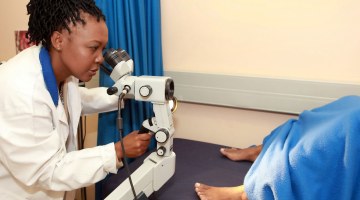via allAfrica.com, by Julie Frederikse
 Africans tracking the worldwide HIV epidemic have not found much to celebrate since Aids began ravaging the continent 30 years ago, but researchers are optimistic that they are learning as much from their failures as their successes.
Africans tracking the worldwide HIV epidemic have not found much to celebrate since Aids began ravaging the continent 30 years ago, but researchers are optimistic that they are learning as much from their failures as their successes.
In July 2010, delegates at the last World Aids conference gave the couple a standing ovation when they announced the results of one of the most promising studies on HIV prevention to date. Their team at the Centre for the Aids Program of Research in South Africa (Caprisa), showed that a vaginal gel called tenofovir was able to reduce sexual transmission of the virus by 39 percent overall and 54 percent in women who used it consistently.
But the euphoria over this breakthrough has dissolved into disappointment, with the unexpected finding of a wider sub-Saharan African study that the microbicidal gel, when prescribed daily, does not prevent HIV infections. This has led to the suspension of tenofovir in the Vaginal and Oral Interventions to Control the Epidemic (Voice) trial.
Read the rest.
[If an item is not written by an IRMA member, it should not be construed that IRMA has taken a position on the article's content, whether in support or in opposition.]
 Africans tracking the worldwide HIV epidemic have not found much to celebrate since Aids began ravaging the continent 30 years ago, but researchers are optimistic that they are learning as much from their failures as their successes.
Africans tracking the worldwide HIV epidemic have not found much to celebrate since Aids began ravaging the continent 30 years ago, but researchers are optimistic that they are learning as much from their failures as their successes.Sub-Saharan Africa still carries the biggest burden of HIV worldwide, and while there has been a significant improvement in access to antiretroviral treatment in recent years, scientists searching for a gel or vaccine that can prevent HIV infection ride a rollercoaster of hope and disappointment.
Take the case of a husband and wife team from the University of KwaZulu-Natal in South Africa. Professors Salim Karim and Quarraisha Abdool Karim head up a research unit that has been at the forefront of clinical trials to find a safe and effective microbicide to protect women from HIV.
In July 2010, delegates at the last World Aids conference gave the couple a standing ovation when they announced the results of one of the most promising studies on HIV prevention to date. Their team at the Centre for the Aids Program of Research in South Africa (Caprisa), showed that a vaginal gel called tenofovir was able to reduce sexual transmission of the virus by 39 percent overall and 54 percent in women who used it consistently.
But the euphoria over this breakthrough has dissolved into disappointment, with the unexpected finding of a wider sub-Saharan African study that the microbicidal gel, when prescribed daily, does not prevent HIV infections. This has led to the suspension of tenofovir in the Vaginal and Oral Interventions to Control the Epidemic (Voice) trial.
Read the rest.
[If an item is not written by an IRMA member, it should not be construed that IRMA has taken a position on the article's content, whether in support or in opposition.]
No comments:
Post a Comment